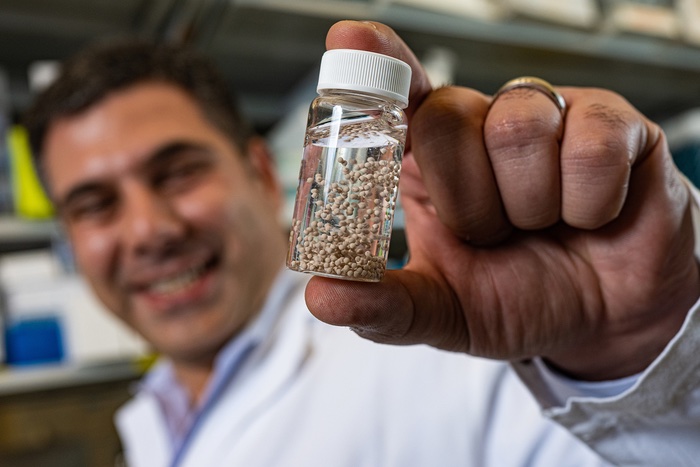Colorectal cancer is a highly treatable and often curable disease when localized to the bowel. Surgery is the primary form of treatment and results in a cure in approximately 50% of the patients. In advanced-stage ovarian cancer, around two in ten women can survive at least 12 years after the treatment. The response to cancer therapy and chances for a cure depend on the type and the staging of each cancer at the time of diagnosis. Now, bioengineers at Rice University and researchers from the University of Texas MD Anderson Cancer Center and the University of Virginia have demonstrated in mice that their treatment can eradicate advanced-stage ovarian and colorectal cancer in as little as six days.
Their findings are published in the journal Science Advances in a paper titled, “Clinically translatable cytokine delivery platform for eradication of intraperitoneal tumors,” and the study was led by Omid Veiseh, PhD, assistant professor of bioengineering and Amanda Nash, a graduate student, and colleagues from Rice, the University of Texas MD Anderson Cancer Center, the University of Virginia, and others.
“Proinflammatory cytokines have been approved by the FDA for the treatment of metastatic melanoma and renal carcinoma,” the researchers wrote. “However, effective cytokine therapy requires high-dose infusions that can result in antidrug antibodies and/or systemic side effects that limit long-term benefits. To overcome these limitations, we developed a clinically translatable cytokine delivery platform composed of polymer-encapsulated human ARPE-19 (RPE) cells that produce natural cytokines.”
The team of researchers used implantable “drug factories” the size of a pinhead to deliver continuous, high doses of interleukin-2. The researchers reported that the drug-producing beads can be implanted with minimally invasive surgery, and each contains cells engineered to produce interleukin-2 that are encased in a protective shell.
“We just administer once, but the drug factories keep making the dose every day, where it’s needed until the cancer is eliminated,” Veiseh explained. “Once we determined the correct dose—how many factories we needed—we were able to eradicate tumors in 100% of animals with ovarian cancer and in seven of eight animals with colorectal cancer.”

“A major challenge in the field of immunotherapy is to increase tumor inflammation and anti-tumor immunity while avoiding systemic side effects of cytokines and other pro-inflammatory drugs,” said study co-author Amir Jazaeri, PhD, professor of gynecologic oncology and reproductive medicine at MD Anderson. “In this study, we demonstrated that the ‘drug factories’ allow regulatable local administration of interleukin-2 and eradication of tumor in several mouse models, which is very exciting. This provides a strong rationale for clinical testing.”
Interleukin-2 is a cytokine, a protein the immune system uses to recognize and fight disease. It is an FDA-approved cancer treatment, but the drug factories provoke a stronger immune response than existing interleukin-2 treatment regimens because the beads deliver higher concentrations of the protein directly to tumors.

“If you gave the same concentration of the protein through an IV pump, it would be extremely toxic,” Nash, a graduate student in Veiseh’s group and the study’s lead author said. “With the drug factories, the concentration we see elsewhere in the body, away from the tumor site, is actually lower than what patients have to tolerate with IV treatments. The high concentration is only at the tumor site.”
The bead’s outer shell shields its cytokine-producing cells from immune attacks. The shells are made of materials the immune system recognizes as foreign objects but not as immediate threats, and Veiseh’s lab leveraged that in its design.
“We found foreign body reactions safely and robustly turned off the flow of cytokine from the capsules within 30 days,” he said. “We also showed we could safely administer a second course of treatment should it become necessary in the clinic.”
Avenge Bio, a Massachusetts-based startup co-founded by Veiseh, has licensed the cytokine-factory technology from Rice.


